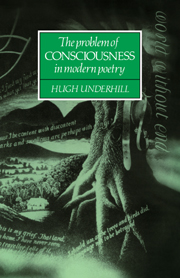Book contents
- Frontmatter
- Contents
- Preface
- Introduction: the inward revolution
- 1 From Georgian origins to ‘Romantic primitivism’: D. H. Lawrence and Robert Graves
- 2 Strangers to nature: modern nature poetry and the rural myth
- 3 The ‘poetical character’ of Edward Thomas
- 4 ‘Myself must I remake’: W. B. Yeats
- 5 ‘Here and now cease to matter’: T. S. Eliot
- 6 The work of Man: Louis MacNeice and W. H. Auden
- 7 ‘Nothing of our light’: Ted Hughes
- Conclusion
- Notes
- Select bibliography
- Index
2 - Strangers to nature: modern nature poetry and the rural myth
Published online by Cambridge University Press: 18 December 2009
- Frontmatter
- Contents
- Preface
- Introduction: the inward revolution
- 1 From Georgian origins to ‘Romantic primitivism’: D. H. Lawrence and Robert Graves
- 2 Strangers to nature: modern nature poetry and the rural myth
- 3 The ‘poetical character’ of Edward Thomas
- 4 ‘Myself must I remake’: W. B. Yeats
- 5 ‘Here and now cease to matter’: T. S. Eliot
- 6 The work of Man: Louis MacNeice and W. H. Auden
- 7 ‘Nothing of our light’: Ted Hughes
- Conclusion
- Notes
- Select bibliography
- Index
Summary
Thus D. H. Lawrence, a miner's son, having acquired enough education to be able to write, was able to write with more verve than most of his contemporaries. He had not inherited the stale thought of a class. But on the other hand, for the reason that he moved out of his class, his thought and vision faded.
(Modern Poetry, p. 76)It may seem a simple point, but in making it Louis MacNeice was appreciating an important source of Lawrence's strength. Lawrence grew up in closer touch with a real England, both industrial and agricultural, than virtually any other writer of his generation, and was able to express that reality with such freshness and ‘verve’ because he was unencumbered (in a way resistant to ‘education’) by the conditioned responses of a cultural establishment. It is not so much that his vision ‘faded’ as he travelled away from his roots, but that it became more and more internalized. Like the Romantic poets before him, he was always conscious of a ‘social’ mission, and creativity on the scale of Lawrence's (his surpassing achievement, the trio of great novels, falls outside my scope here) invariably refuses to be reduced to the measure of its detractors. But he repeats, I think one can generalize, a classic Romantic profile: what begins as a challenge, with revolutionary implications, to a social condition, withdraws to an inward or ‘other’ world.
- Type
- Chapter
- Information
- The Problem of Consciousness in Modern Poetry , pp. 65 - 88Publisher: Cambridge University PressPrint publication year: 1992



